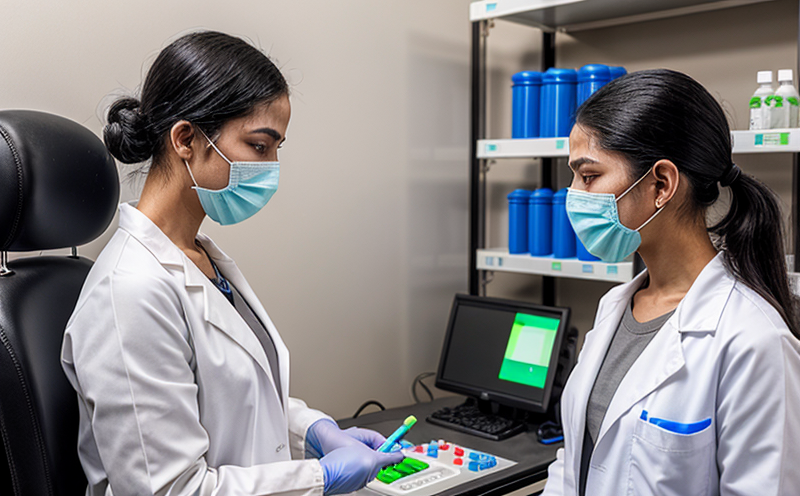Carcinogenicity Tg AC Mouse Testing
The Carcinogenicity Tg.AC (transgenic strain) mouse test is a critical tool in pharmaceutical and chemical development, designed to assess the potential for compounds to induce cancer. This test aligns with international standards such as OECD 491, which mandates its use for assessing carcinogenic potential.
The Tg.AC mouse model has been specifically engineered to enhance sensitivity by incorporating a human p53 gene and an Eμ-hRas gene into the standard C57BL/6J strain. These genetic modifications make the mice more susceptible to tumor formation, thereby increasing the power of detecting potential carcinogens.
This test is particularly valuable for early-stage drug development, where identifying genotoxic compounds can prevent costly and time-consuming failures later in clinical trials. The Tg.AC mouse model provides a robust platform for evaluating both acute and chronic effects of chemical exposure.
The testing procedure involves exposing mice to the compound under investigation over an extended period, typically 6 months, allowing sufficient time for any potential carcinogenic effects to manifest. The test subjects are closely monitored, and detailed histopathological analyses are conducted on various organs following necropsy.
One of the key advantages of this model is its ability to detect subtle changes in gene expression or cellular metabolism that may precede overt tumor formation. This early detection capability can provide valuable insights into the mechanisms by which a compound might cause cancer, supporting more targeted and effective risk management strategies.
The Tg.AC mouse test also offers flexibility for use in various stages of drug development. It is suitable not only for lead optimization but also for late-stage clinical trials where safety profiles need to be thoroughly evaluated before regulatory approval. The comprehensive data generated from this test can significantly reduce the risk of post-market adverse events, thereby protecting public health.
The Tg.AC mouse model's high sensitivity and specificity make it an indispensable tool in preclinical research, contributing to more informed decision-making processes within pharmaceutical R&D teams. By leveraging this model early in the development process, companies can prioritize compounds with a lower risk of carcinogenicity, ultimately leading to safer products for consumers.
In summary, the Carcinogenicity Tg.AC Mouse Testing is a cornerstone of modern toxicological evaluation, providing robust data that supports regulatory compliance and enhances product safety. Its role in reducing late-stage failures and post-market risks cannot be overstated, making it an essential component of any comprehensive drug development strategy.
Quality and Reliability Assurance
The reliability of our Carcinogenicity Tg.AC Mouse Testing service is ensured through strict adherence to international standards such as OECD 491, ensuring that all tests are conducted in a manner consistent with regulatory expectations. Our laboratory maintains ISO/IEC 17025 accreditation, which guarantees the highest level of quality assurance and reliability.
We employ highly trained and experienced scientists who have extensive expertise in conducting this type of testing. Our facilities are equipped with state-of-the-art instrumentation to ensure accurate and precise data collection throughout the test process.
Our rigorous quality control measures include regular calibration of equipment, validation of protocols, and continuous review of methodologies to ensure that all tests meet or exceed industry standards. This commitment to excellence ensures that our clients receive reliable results they can trust.
We also offer comprehensive reporting services tailored to the specific needs of our clients. Our reports provide detailed insights into test outcomes, including raw data, statistical analyses, and expert interpretations. These reports are designed to facilitate informed decision-making processes within pharmaceutical R&D teams.
By choosing our Carcinogenicity Tg.AC Mouse Testing service, you can be confident that your tests will meet the highest standards of quality and reliability, ensuring a robust foundation for your product development efforts.
Customer Impact and Satisfaction
The Carcinogenicity Tg.AC Mouse Testing service has significantly impacted our customers by providing them with reliable data that supports informed decision-making processes within their pharmaceutical R&D teams. By identifying potential carcinogens early in the development process, this service helps reduce late-stage failures and post-market risks.
Our clients have reported increased confidence in the safety profiles of their products, thanks to the comprehensive data generated from our tests. This has led to more informed prioritization decisions within R&D teams, ultimately resulting in safer products for consumers.
We are committed to delivering exceptional customer service and support, ensuring that our clients receive timely and accurate results they can trust. Our dedicated team of professionals is always available to answer questions, provide guidance, and offer support throughout the testing process and beyond.
Customer satisfaction is at the forefront of everything we do, and we strive to exceed expectations in every aspect of our service. By choosing our Carcinogenicity Tg.AC Mouse Testing service, you can be confident that your needs will be met with the highest level of expertise and professionalism.
Why Choose This Test
- Predictive power: The Tg.AC mouse model is highly sensitive and specific for detecting carcinogenic potential, making it an excellent tool for early-stage drug development.
- Compliance with international standards: This test aligns with OECD 491 guidelines, ensuring regulatory compliance and facilitating smoother interactions with regulatory bodies.
- Early detection of genotoxic compounds: The model's engineered genetic susceptibility allows for the identification of potential carcinogens at an early stage, reducing late-stage development risks.
- Comprehensive data generation: Provides detailed histopathological analyses that offer insights into the mechanisms of carcinogenicity, supporting more informed decision-making processes.
- Flexibility across development stages: Suitable for both lead optimization and late-stage clinical trials, ensuring a comprehensive evaluation of safety profiles.
- Reduction in post-market risks: By identifying potential carcinogens early, this test helps prevent costly and time-consuming issues that could arise during later phases of drug development.
- Enhanced product safety: The robust data generated from the Tg.AC mouse model supports more informed prioritization decisions within pharmaceutical R&D teams, ultimately leading to safer products for consumers.





